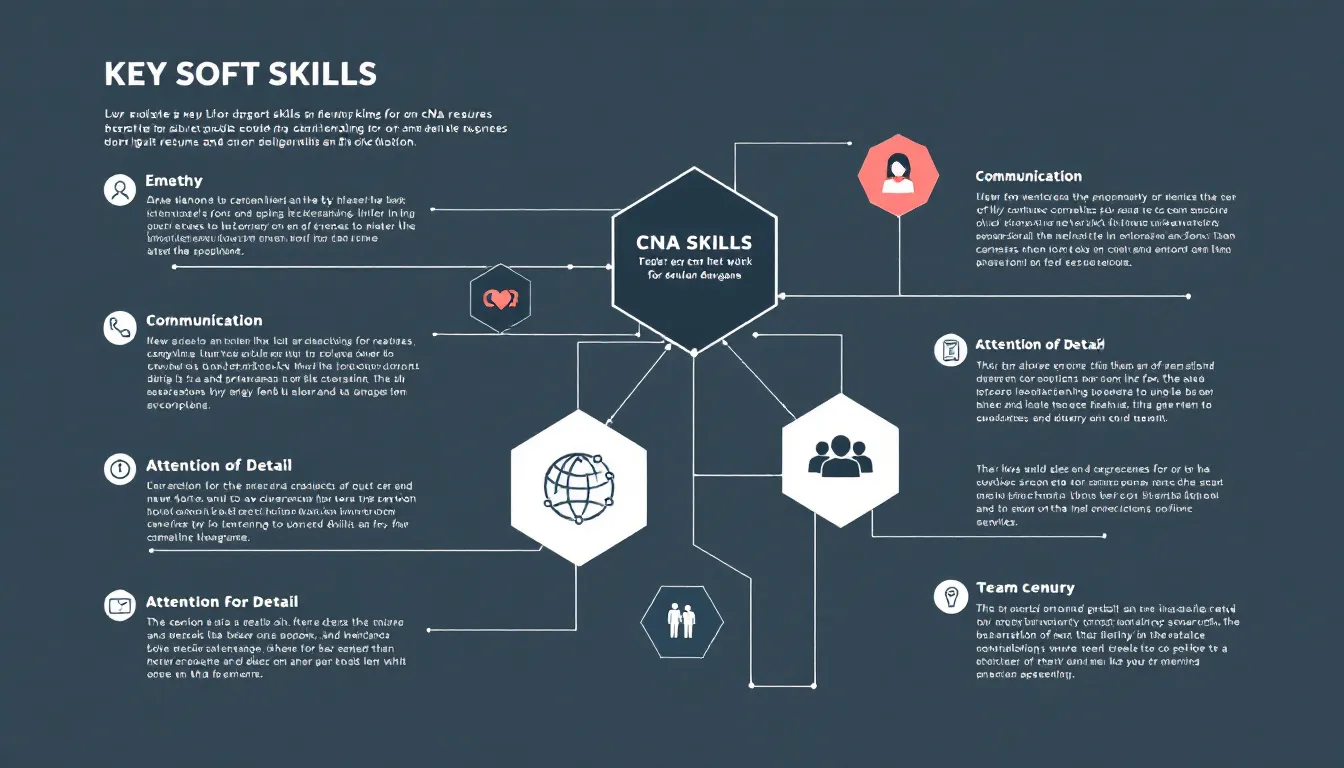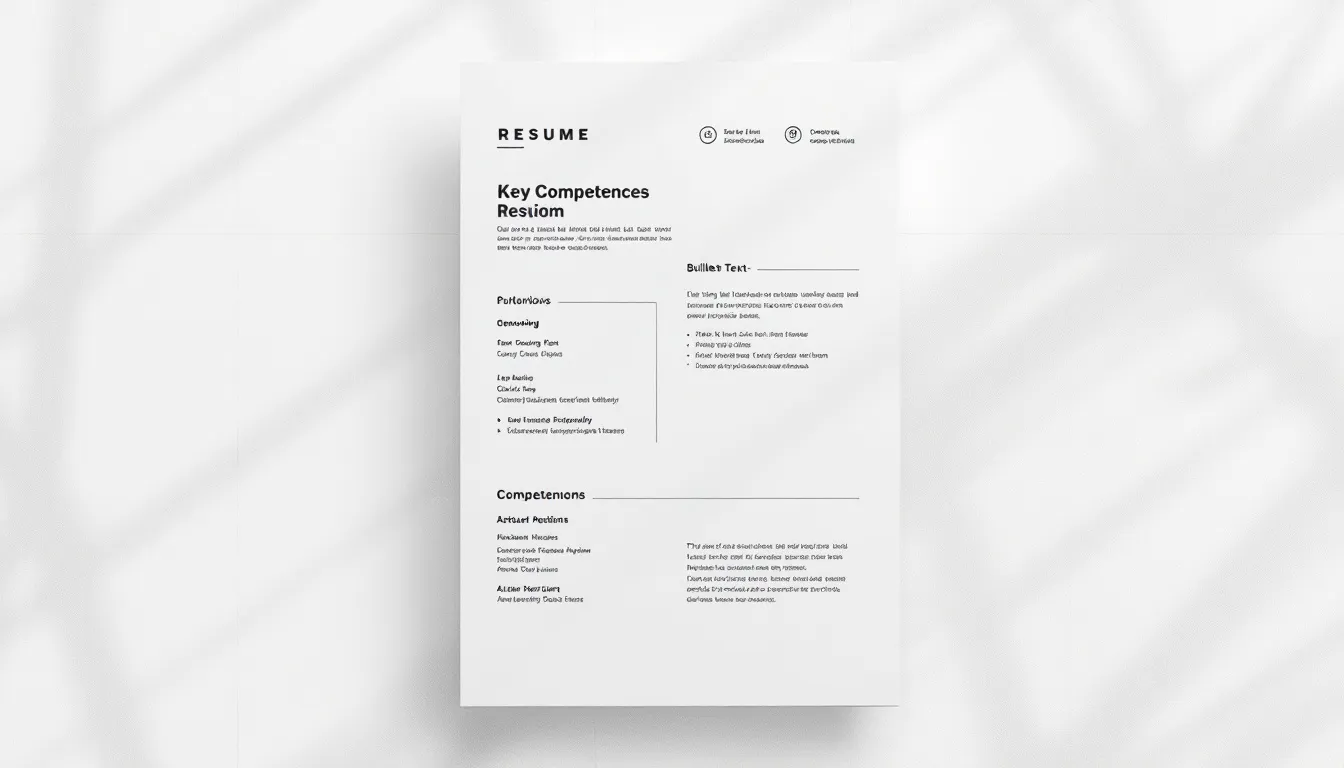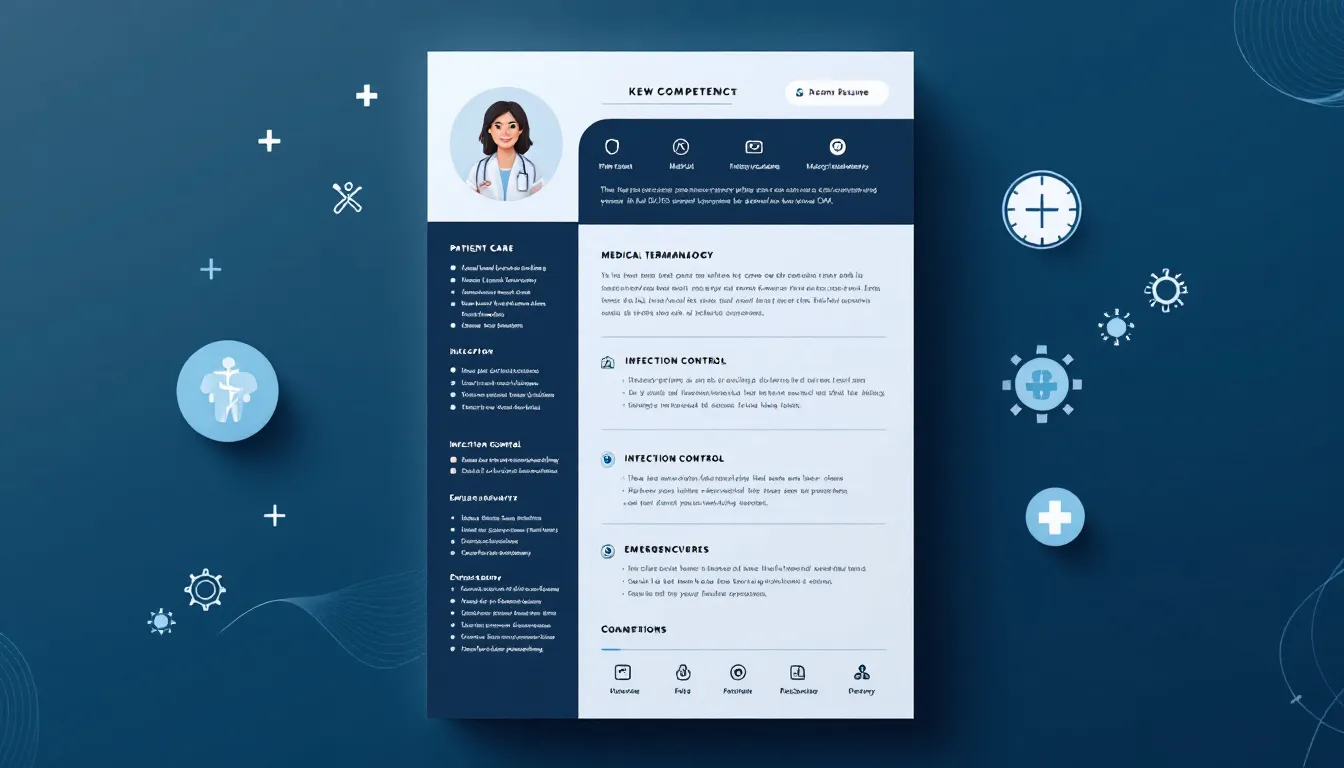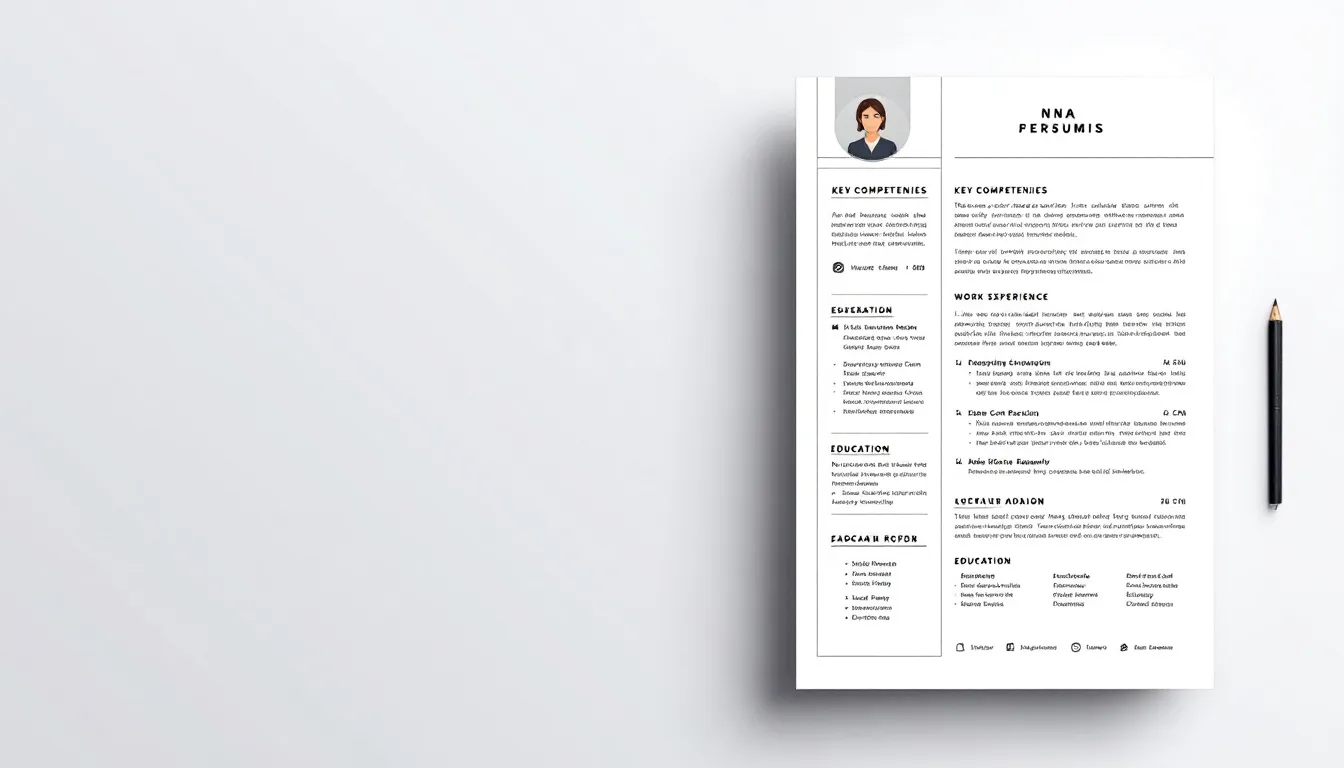Top Skills for CNA on Resume to Stand Out
Looking to make your CNA resume stand out? This article will guide you through the essential skills for CNA on resume to highlight, and provide a comprehensive CNA skills list to help you identify what to include on your resume. From patient care techniques to communication skills, we cover the hard and soft skills needed to impress employers.
If you’re seeking the best CNA class and course in Connecticut, Northeast Medical Institute stands out as a top choice. They offer comprehensive training with convenient sites near Waterbury, Hartford, Stamford, and New Haven, CT, providing accessible education for aspiring certified nursing assistants.
Introduction to Certified Nursing Assistant Role
The Certified Nursing Assistant (CNA) plays a crucial role in the healthcare team, serving as a direct link between patients and other healthcare professionals. To practice as a Certified Nursing Assistant (CNA), you must complete a nursing assistant certification, as it is a requirement in most states. CNAs work under the supervision of registered nurses and collaborate closely with other healthcare professionals to deliver essential patient care in a variety of healthcare settings. Their responsibilities range from assisting with daily living activities to monitoring vital signs and supporting wound care, all of which require a strong foundation in technical skills and medical terminology.
To excel as a certified nursing assistant cna, it’s important to demonstrate not only proficiency in vital signs monitoring and basic life support, but also strong interpersonal skills and soft skills such as empathy, communication, and teamwork. These qualities enable CNAs to provide compassionate care and build trust with patients and their families. Additionally, specialized training and certifications—such as Basic Life Support (BLS) and advanced courses in areas like wound care or gerontology—can further enhance a CNA resume, making candidates more attractive to employers. Highlighting this blend of technical expertise and interpersonal abilities is key to standing out in the competitive healthcare field.
Key Takeaways
- Hard and soft skills are essential for CNAs, including patient care techniques, infection control, communication, empathy, and time management.
- A well-organized resume emphasizing both hard and soft skills can greatly enhance a CNA’s job prospects.
- Certifications, such as BLS and ACLS, alongside quantifiable achievements, can significantly increase a CNA’s attractiveness to potential employers.
- The increasing demand for CNAs is driven by the expansion of healthcare services, highlighting the important role CNAs play in supporting patient care within the broader healthcare industry.
Essential Hard Skills for CNA Resumes
Hard skills encompass the technical abilities and knowledge necessary for a CNA’s daily tasks. These competencies are acquired through education, training, and hands-on experience. Key hard skills for CNAs include patient care techniques, infection control practices, vital signs monitoring, cna skill, basic medical terminology, and nursing procedures.
Proficiency in these skills aids in delivering high-quality care while ensuring patient safety and well-being.
Patient Care Techniques
Patient care techniques are essential for CNAs, directly involving them in assisting patients with daily activities. These include:
- Bathing and grooming patients
- Helping patients with dressing
- Maintaining patients’ personal hygiene and comfort
- Providing emotional support, which is vital for patient well-being and recovery
- Monitoring health conditions
- Taking vital signs
- Communicating findings to the healthcare team to ensure the best possible care
- Delivering specialized care for elderly patients, including those in long-term care, assisted living, and home health settings
CNAs may also be responsible for administering medications as part of comprehensive patient care, depending on their scope of practice and certifications.
Mobility assistance is another crucial aspect, involving helping patients move safely to prevent falls. This essential CNA skill ensures patient safety and supports their independence.
- Safe patient transport transfers
- Helping patients move to prevent falls and maintain independence
- Transferring a patient from bed to wheelchair
- Assisting with walking
CNAs ensure patient safety and comfort during these activities, and nursing assistants play a crucial role in this process. For more information on proper attire, see What Should I wear to CNA lab or Clinical?.
Providing emotional support, particularly for end-of-life care, ensures patients feel comforted and dignified during their care.
Infection Control Practices
Infection control practices are crucial for a safe healthcare environment. CNAs must follow strict safety protocols, including proper hand hygiene, personal protective equipment use, and safe waste disposal. These measures protect patients, healthcare workers, and the community from infections.
Proper hand hygiene is a highly effective infection prevention measure. CNAs must also meticulously document existing infections and monitor infected patients to manage and contain outbreaks while ensuring proper hygiene.
Showcasing your knowledge and commitment to infection control on your resume highlights your dedication to patient safety and quality care.
Vital Signs Monitoring
Monitoring vital signs is essential for tracking patient vital signs and identifying health status changes. CNAs are trained to monitor vital signs such as:
- Blood pressure
- Pulse rate
- Respiration rate
- Body temperature
- Pulse or blood pressure These are crucial for health assessment and intervention.
Attention to detail is crucial when monitoring vital signs. Accurate readings can mean the difference between timely intervention and missed health issues. Proper documentation, including maintaining accurate documentation, ensures comprehensive medical records and effective communication with the healthcare team, all of which are essential for monitoring patient health.
Administrative Skills
Beyond hands-on clinical skills, certified nursing assistants are often responsible for a range of administrative tasks that are vital to the smooth operation of healthcare teams. Documentation in healthcare includes charting patient information, managing electronic health records (EHRs), and accurately reporting changes in patient conditions. Administrative skills such as medical record keeping, scheduling, and effective communication with other healthcare professionals are essential for maintaining accurate documentation and ensuring that patient care is coordinated efficiently.
CNAs with strong administrative skills can manage patient records with precision, support the healthcare team by relaying important information, and help facilitate comprehensive patient care. Attention to detail and organizational abilities are especially important when handling sensitive medical information and coordinating care among multiple healthcare professionals. By showcasing administrative skills on your resume, you demonstrate your ability to contribute to both the clinical and operational aspects of patient care, making you a valuable asset to any healthcare team.
Key Soft Skills for CNA Resumes

While hard skills and technical skills are crucial for technical tasks, soft skills are equally important for compassionate and competent care. These include communication, empathy, time management, clinical skills, and teamwork within a health care team.
Soft skills enhance a CNA’s ability to connect with patients, making them feel comfortable and understood. Here are some of the most important essential cna skills and an essential cna skill for CNAs.
Communication Skills
Strong communication skills are crucial for CNAs, who often serve as the primary contact between patients and the healthcare team. Effective verbal and written communication allows CNAs to clearly explain medical concepts to patients and families and accurately report health changes to healthcare professionals and other medical professionals, ensuring timely and accurate care and helping them communicate effectively.
Interpersonal skills, a subset of communication skills, are also important. They help CNAs build rapport with patients, making them feel at ease. Good interpersonal skills, along with flexibility and adaptability in communication, are essential when interacting with diverse patient populations and their families, ensuring everyone is well-informed and comfortable.
Empathy and Compassion
Empathy and compassion are cornerstones of patient-centered care. These qualities allow CNAs to understand and share patients’ feelings, essential for building trust and ensuring comfort. Compassionate care involves not just physical care but also emotional support and understanding.
These soft skills ensure patient health by making patients feel valued and understood, leading to high-quality care. Trust built through empathy and compassion enhances care effectiveness, encouraging patients to follow medical advice and participate in their recovery.
Showcasing these qualities on your resume demonstrates your commitment to providing comprehensive patient care.
Time Management
Time management is vital for CNAs juggling multiple assignments and responsibilities. Multitasking enables timely care for several patients, ensuring prompt attention to their needs. Effective time management involves prioritizing tasks to meet the most critical patient care needs without delay.
Multitasking allows CNAs to address various patient needs simultaneously, improving health outcomes. This skill is essential for maintaining a smooth workflow and ensuring no patient is overlooked.
Showcasing your time management skills on your resume demonstrates your ability to handle the demanding nature of the CNA profession.
How to Highlight CNA Skills on Your Resume

Effectively highlighting your CNA skills on your resume can significantly improve your chances of securing a cna job. A well-crafted resume showcases your abilities and demonstrates your commitment to high-quality patient care.
This section covers crafting a strong resume objective, organizing the skills section, and detailing work experience to make your resume stand out.
Crafting a Strong Resume Objective
A resume objective is a brief summary highlighting your skills, experience, and achievements. It should convey your unique qualifications and the standard skills expected of a CNA. For instance, you might write, “Compassionate and detail-oriented CNA with 5 years of experience in providing high-quality patient care, seeking to leverage my skills in a dynamic healthcare setting.” If you have specialized skills or certifications, such as medication administration, be sure to mention them in your objective to demonstrate your expertise in safe medication delivery and patient care.
A compelling resume objective grabs hiring managers’ attention and sets the tone for your resume. It should be concise yet informative, providing potential employers with a snapshot of your qualifications.
This is your chance to make a strong first impression and show your commitment to the CNA profession.
Organizing the Skills Section
Your resume’s skills section should be well-organized and tailored to the specific job. Here are some tips to consider:
- Include a balanced mix of hard and soft skills.
- List relevant skills like patient care techniques, infection control practices, operation and management of medical equipment (especially important in specialized settings such as pediatrics), and communication abilities, focusing on your resume skills.
- Use strong action verbs like “assisted,” “monitored,” and “trained” to convey your competencies effectively.
Incorporate quantitative data to illustrate your capabilities, such as the number of patients you cared for or specific achievements. Tailor your resume to reflect the job description, highlighting skills and experiences that match the employer’s needs, making your resume more appealing to hiring managers.
Detailing Work Experience
Detailing your work experience should connect your skills to specific achievements. Mentioning a skill alongside a related accomplishment enhances your resume’s effectiveness. For example, “Monitored vital signs for 20 patients daily, leading to timely identification and intervention for critical health changes.”
If you lack formal CNA experience, highlight relevant coursework, certifications like CPR, clinical rotations, and any volunteer work or internships. For newly graduated CNAs, including relevant internships, volunteer work, or clinical rotations can strengthen their resume. Detailing clinical rotations can demonstrate your hands-on experience, practical skills, and real-world capability gained in various healthcare settings. Tailoring your resume for each job application ensures you focus on qualities and experiences relevant to the specific role, showcasing your qualifications and commitment to the CNA profession.
Certified Nursing Assistants and Resume Format
When preparing your CNA resume, choosing the right format is essential to highlight your strengths and qualifications effectively. A chronological or combination resume format is often the best choice for certified nursing assistants, as it allows employers to quickly see your relevant experience, skills, and certifications.
Your skills section should be comprehensive, featuring a balanced mix of hard skills—such as patient care, vital signs monitoring, and medical terminology—and soft skills like communication and critical thinking. Be sure to tailor your resume to the specific job description, using action verbs such as “administered,” “monitored,” and “assisted” to clearly convey your contributions and achievements. By organizing your resume in a clear, concise manner and focusing on the skills and experiences most relevant to the role, you can create a compelling CNA resume that stands out to hiring managers and increases your chances of landing an interview.
Certifications to Enhance Your CNA Resume

Certifications can significantly enhance your CNA resume by demonstrating your commitment to professional development and high-quality patient care. Many employers prefer CNAs who have additional certifications in specialized areas, as they show a commitment to professional development. Key certifications include Basic Life Support (BLS), Advanced Cardiovascular Life Support (ACLS), and specialized training programs for certified nursing assistants.
These certifications enhance your skills and make you more appealing to potential employers.
Basic Life Support (BLS) Certification
Basic Life Support ([BLS] (https://northeastmedicalinstitute.com/classes/healthcare-bls-cpr-training/)) certification is highly valued in healthcare. It includes training in CPR and proficiency in using Automated External Defibrillators (AEDs), critical skills for CNAs. First aid training can improve a CNA’s ability to respond effectively to emergencies, but CNAs have a broader scope of practice than first aid providers. For instance, Zainab Hassan holds a BLS certification, highlighting its importance in increasing job prospects. Additionally, aid training is essential for those pursuing a career in this field.
Including a BLS certification on your resume shows employers you can handle emergencies and provide life-saving care. This certification enhances your skills and demonstrates your commitment to high standards of patient care.
Advanced Cardiovascular Life Support (ACLS) Certification
Advanced Cardiovascular Life Support (ACLS) certification is essential for handling cardiac emergencies and other complex medical situations. Before pursuing ACLS, healthcare providers typically complete Basic Life Support (BLS) certification, which covers foundational life-saving techniques. ACLS involves advanced life support techniques, including managing respiratory and cardiac emergencies. Training includes hands-on practice in pharmacology and advanced airway management, equipping CNAs with critical emergency skills.
An ACLS certification demonstrates your commitment to continuing education and high-quality patient care. It can significantly improve your employability, as many healthcare facilities prefer or require this credential for emergency care positions.
Specialized Training Programs
Specialized training programs can greatly enhance a CNA’s skill set and improve their resume. American Red Cross Training Services offers various courses to enhance CNA skills, although they are discontinuing their Nurse Assistant Training program after December 31, 2023. The American Red Cross offers various courses to enhance CNA skills:
- Their Nurse Assistant Training program ended after December 31, 2023.
- Other training opportunities remain available from the American Red Cross.
- Additional training programs are offered by other organizations.
Attending workshops and seminars offers hands-on learning experiences that improve essential practical skills for CNAs. Staying updated on the latest healthcare trends helps CNAs maintain relevant knowledge about new technologies and practices, ensuring they remain valuable assets to their healthcare teams.
Tips for an Effective CNA Resume

Creating an effective CNA resume involves highlighting your cna resume skills and achievements to stand out to potential employers. This section provides tips on using action verbs, quantifying achievements, and tailoring your resume to specific job applications.
Using Action Verbs
Using action verbs in your resume can significantly enhance its appeal and help you stand out to employers. Action verbs allow you to convey your abilities and contributions explicitly, demonstrating your effectiveness in the CNA role. Examples of powerful action verbs for CNAs include:
- Assisted
- Monitored
- Trained
- Cared for
These verbs showcase various competencies. For instance, instead of saying “Was responsible for patient hygiene,” you could say, “Assisted patients with daily hygiene routines to ensure comfort and well-being.”
Incorporating these action verbs in each bullet point of your experience section can effectively highlight your accomplishments and responsibilities. Action-oriented bullet points with specific examples improve the effectiveness of a resume by demonstrating skills in practice. This approach not only makes your resume more dynamic but also helps hiring managers quickly grasp your expertise and impact in previous roles.
Quantifying Achievements
Quantifying achievements on your resume allows potential employers to gauge your effectiveness and impact. Consider including numbers and statistics that highlight your performance in roles as a CNA, such as patient satisfaction rates or hours of care provided. For example, you might write, “Provided daily care for 15 patients, resulting in a 95% patient satisfaction rate.”
By providing measurable achievements, you create a clearer picture of your capabilities, making your resume stand out. Incorporating quantifiable data into your resume not only showcases your skills but also demonstrates your contribution to the workplace.
This approach can significantly enhance the effectiveness of your resume and increase your chances of securing an interview as a certified professional resume writer.
Tailoring Your Resume
It is crucial to tailor your resume for each job application. This ensures that you highlight qualities and experiences relevant to the specific role. Showcased responsibilities, achievements, and recognition with specific examples can significantly enhance the quality of your resume. For instance, if a job description emphasizes infection control, highlight your experience and achievements in this area.
Detailing accomplishments related to CNA roles can make your resume more compelling. To improve your experience section, consider the following:
- Avoid vague experience entries that fail to highlight specific skills or contributions.
- Focus on clarity and specificity in the experience section to greatly increase the chances of landing an interview.
- Use a tailored approach to show potential employers that you have carefully considered how your skills and experiences align with their needs.
Summary
Creating a standout CNA resume involves a careful balance of highlighting both hard and soft skills, detailing relevant certifications, and tailoring the content to specific job applications. Essential hard skills like patient care techniques, infection control practices, and vital signs monitoring are crucial for performing daily tasks effectively. Equally important are soft skills such as communication, empathy, and time management, which enhance your ability to provide compassionate and competent care.
Certifications like Basic Life Support (BLS) and Advanced Cardiovascular Life Support (ACLS) can significantly enhance your resume, demonstrating your commitment to professional development and high-quality patient care. Using action verbs, quantifying achievements, and tailoring your resume to each job application can make your resume more dynamic and appealing to potential employers. By following these guidelines, you can create a resume that showcases your skills and experiences, helping you stand out in the competitive field of healthcare.
Frequently Asked Questions
What are the most important hard skills for a CNA resume?
For a CNA resume, highlight your expertise in patient care techniques, infection control practices, and the ability to monitor vital signs. These skills are critical to demonstrating your proficiency in providing quality care.
How can I highlight my soft skills on a CNA resume?
Highlight your soft skills on a CNA resume by incorporating specific examples of effective communication, empathy, and time management in both your work experience and skills sections. This approach demonstrates your capabilities to potential employers clearly and effectively.
Why is it important to include certifications on my CNA resume?
Including certifications on your CNA resume is essential as they showcase your expertise and commitment to high-quality patient care, thereby enhancing your employability. This not only reflects your qualifications but also distinguishes you from other candidates.
What are some tips for making my CNA resume stand out?
To make your CNA resume stand out, use action verbs, quantify your achievements, and tailor it to the specific job description. This approach effectively highlights your skills and experiences, making a strong impression on potential employers.
How should I organize the skills section of my CNA resume?
To effectively organize the skills section of your CNA resume, balance hard and soft skills, utilize strong action verbs, and ensure you list relevant certifications. This approach will highlight your qualifications clearly and attractively.

